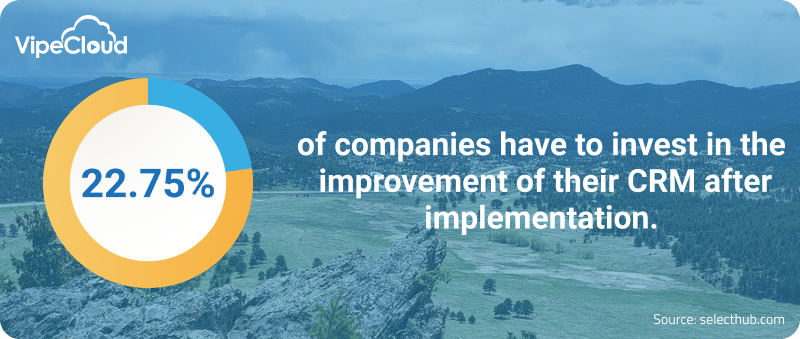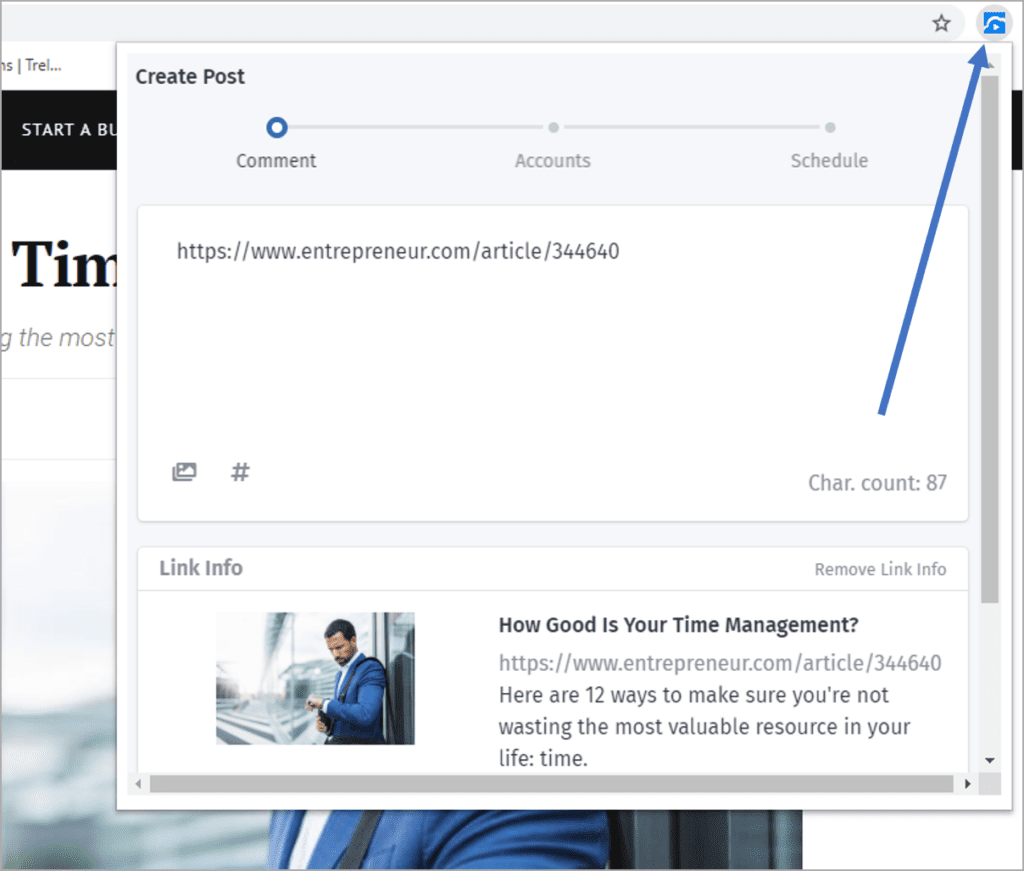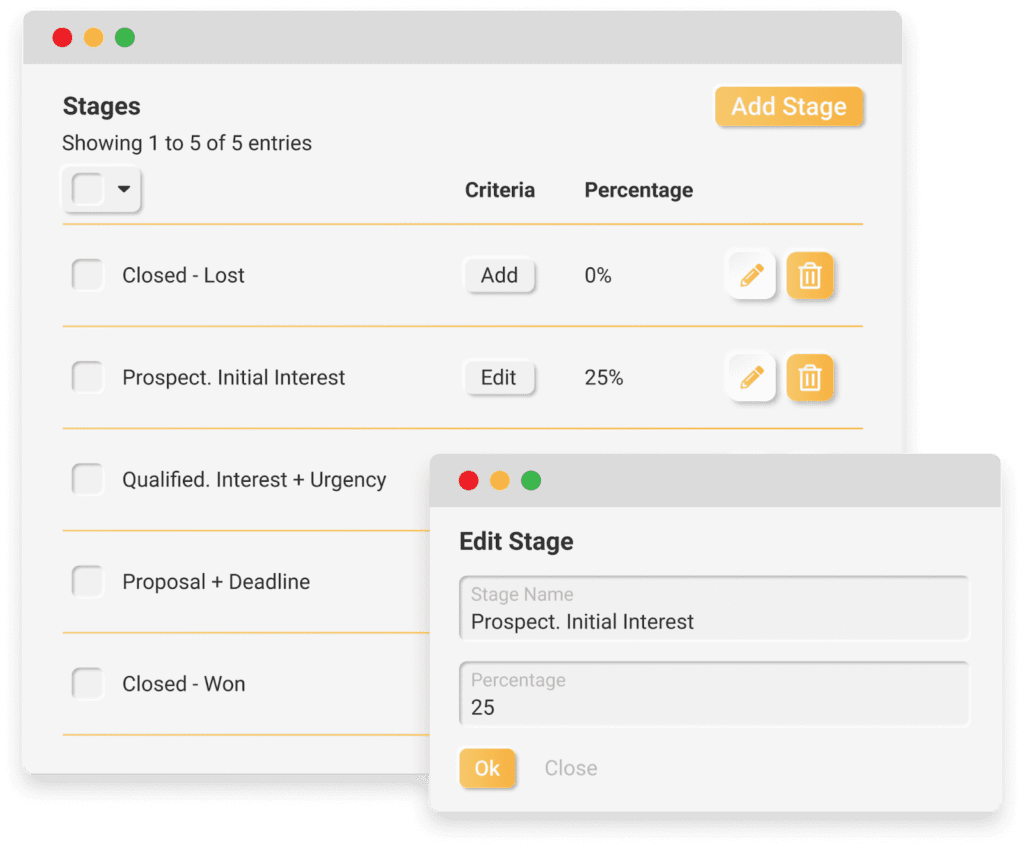Last updated on August 7th, 2023

Look at many businesses in today’s age, and you’ll find that they leverage outer support to become successful:
An outsourced agency, consultancy, coach, you name it.
But very few talk about CRM consulting as a way of boosting your company’s success with CRM technology.
Yes, it’s very easy to think:
“How hard can it be?”
But remember, not all CRMs are made equal.
Today we’ll explore whether a CRM consultant would be suitable for your business and, if not, what the best alternative is.
We’ll cover:
- You Might Not Need A CRM Consultant
- What Is CRM Consulting?
- Why Is CRM Consulting Beneficial?
- How To Find The Best CRM Consultant For You
- Pros And Cons Of Hiring A CRM Consultant
- Do You Need A CRM Consultant?
- Why It’s Vital To Have A Tailored CRM
- The Premier CRM Tailored For Small To Medium-Sized Businesses

VipeCloud is the only Automation tool your small business needs to
be the hero to your customers.
With Email, Texting, Social, Suites, Chat, Stories, Video Email & Sign Up Forms fully built-in, we provide you with the perfect platform to grow your business.
15 Day Free Trial – Get started risk free. No CC needed.
Before We Begin: You Might Not Need A CRM Consultant
Before you go down the journey of looking for a CRM consultant, there’s something important to remember.
You actually have another option.
What is it?
It’s investing in a CRM that’s going to be better suited for your business from the start.
Because here’s the truth:
Not every business needs to deal with the complexity of a CRM like Salesforce.
A few of the biggest CRMs like Salesforce are made for those larger, enterprise-level companies with huge budgets to hire a consultant just to help them with their CRM.
And as you’ll soon find out, CRM consultants can be costly — so costly that it might actually be a better ROI move for you to invest in a CRM more tailored to you rather than paying a consultant.
Consider the cost of hiring a CRM consultant versus switching to a CRM that will be so intuitive that you won’t need one.
At VipeCloud, we understand the struggle of implementing a CRM with the complexity of the Millennium Falcon. Because the fact of the matter is — chances are your company doesn’t need a spaceship to go from Point A or Point B. Your company might only need a Ferrari or maybe an Audi R8.
What Is CRM Consulting?
CRM consulting is the practice of helping a company or organization improve and manage customer relations, sales, and marketing.
CRM consultants are hired professionals that know the ins and outs of CRM technology like the back of their hand.
They also help organize the company internally, meaning they can advise marketing and sales departments on how to improve their top and middle of funnel conversions.
With many businesses using a CRM nowadays, you can bet that there are a handful that can use a good consultant.
Lastly, CRM consulting professionals are typically outsourced from an agency or within the CRM company (and sometimes, creators of the CRM tool) themselves.
Why Is CRM Consulting Beneficial?
22.75% of companies have to invest in improving their CRM after implementation.

This is where the demand for CRM consultants comes from.
Have you ever bought a business computer that you considered somewhat of a big investment?
You likely asked the salesperson a ton of questions, and they gave advice based on what they knew.
CRM consultants do something very similar.
They help you choose the best CRM system based on your needs.
For example, say your company needs a bigger social media presence:
Your consultant would help you narrow down and pick a CRM that is made to help with social media.

From there, it’s all about helping your organization get the most out of your CRM by leveraging the right sales and marketing features to be successful.
Which can really help save you confusion, trial, error and wasted time!
(This is especially the case for larger companies that have more moving parts!)
The end goal with CRM consultants isn’t just using a great CRM with all of the bells and whistles — it’s also to help you create systems that will help with customer satisfaction & retention, company productivity, and predictable upward revenue.
To bring all these benefits to your company, your CRM consultant should have several attributes.
How To Find The CRM Consultant For You
Whether you’re hiring internally or externally, there are always key attributes your candidate or new business partner should exhibit.
Before getting into the attributes, here are 5 best practices when hiring a CRM consultant:
- Ask about their experience in your niche.
- Ask for any case studies from past clients in your niche.
- Ask about their experience as a CRM consultant.
- Have at least two meetings with the consultant before the project officially starts.
- Optional: Ask for industry references.
Now, In this section, we’ll classify 4 super-important traits your CRM consultant must-have. (If you decided to work with one.)
Great Listening Skills
Listening skills are a hallmark of stellar business communication, and it’s what an elite CRM consultant does before formulating a plan for you.
Listening helps people gain facts, which aids in making decisions that benefit a business.
They should continually ask questions and listen to your answers to tweak the CRM strategy.
Mention the improvements you hope to see in your business and its time frame — maybe it’s a higher conversion rate, alternative lead generation strategies, better customer retention rate, and so on.
With good listening skills in place, there’s a lesser likelihood of miscommunication.
Not to mention, if you’re in sales, you religiously understand the importance of listening and communication.
A Good Strategist
Great CRM consultants are solid tacticians.
Based on what they know and their experience, they help you and other decision-makers strategize on a marketing and sales plan.
This is achieved through a “Gap Analysis,” eliminating the gap between where your business currently is and where you want it to be.
From there, a CRM audit is done to assess what optimizations and integrations are needed to reach business KPIs.
Also:
When a CRM strategy is in place, it changes the way you approach sales and marketing, plus you’ll have best practices you can use over and over again.
And guess what?
Your customers will benefit from your improvements, which will make your business a lot harder to compete with.
Elite Problem Solver
“We can not solve our problems with the same level of thinking that created them.” – Albert Einstein.
CRM consultants act as a second “brain” that solves and troubleshoots those teeth-clenching CRM problems.
For example, say your CRM consultant notices that your sales team has an inefficient way of handling email.
Your reps send emails via your CRM, but they have to constantly go to their email inbox to see all their conversations with prospects.
A simple solution would be for reps to sync the CRM with their email inbox to see all their convos in one place.
Because without it, your CRM will only display the outbound emails that are sent directly from the system (unless a customer replies, of course).
This is a time-saving solution to a sales productivity problem and can lessen the need to switch from inbox to inbox constantly.
Multiply this by just 6 sales reps, and you’ve already made quite a big difference just from this tweak.
Fantastic Team Player
Last but not least, great CRM consultants are amazing team players.
They work in harmony with your business analysts, marketing, and sales directors to find solutions.
CRM consultants should be adaptable to the company while still bringing new ideas and plans (since that’s what elicits change after all).
Here are qualities of a good team player according to Boss Staff, a staffing services firm:
- Transparency
- Flexible (Good with change)
- Supportive
- Reliable
- Constructive communication (freely express their opinions and ideas.)
Team players share the same company values and attitudes, which makes for a good business relationship.
A CRM consultant that “has your back,” so to speak, is the perfect person to make decisions on what your most important tool (your CRM) should do.
Pros and Cons Of Hiring A CRM Consultant

Now let’s get objective.
We’re going to explore the pros and cons of hiring a CRM consultant, so you can start to get a feel for what they can potentially bring to your business.
Pros of CRM Consultants
Optimizations And Company Improvements
Mentioned earlier, a CRM consultant helps improve how you handle your CRM and the company internally.
CRM consultants can help improve your company’s operations by analyzing the data in your CRM.
This makes CRM consulting a measurable way to constantly improve your company from the inside out.
Speed Of Implementation
Speed of implementation is the rate at which you can tangibly apply ideas or strategies.
A CRM consultant acts as a guiding hand to hold you and your team accountable for implementing the right strategies promptly.
This is super important because things change very quickly in business, so implementing a strategy could mean the difference between a profitable or a non-profitable month.
The speed of implementation CRM consultants bring is especially major for larger companies.
Why?
Well, big companies naturally have more hierarchical structures, which causes more things to need an “OK” before being implemented.
This causes an unfortunate slow down that smaller companies usually don’t have to deal with. (Smaller companies can adapt to changes a lot faster than bigger companies since the process for tweaks getting approved is typically shorter.)
Speed of implementation is the barometer to how fast a company grows.
Access To A Knowledgeable Expert
CRM consultants are usually specialized experts when it comes to systems.
Not only can they advise you on your campaigns and customer retention goals — But they’re easily accessible, which makes it convenient for you to schedule meetings when needed.
Picture this:
The United States president doesn’t run the country himself, does he?
Nope, he has a cabinet of very smart people who advise him on which bills to sign off.
The takeaway?
Knowledgeable experts are always a fundamental way of letting you consider new and better ideas.
Cons of CRM Consultants
Hefty Cost
As helpful as CRM consultants are, often, the price tag has a lot of digits in it.
That’s right, CRM consultants can come with a hefty cost and if you’re a small to medium-sized business, setting up your business budget for one is paramount.
Many CRM consultancy service providers charge per task that’s needed when consulting…
For instance:
- Project management
- User training
- Data migration
- Opportunity configuration
- General system configuration and user setup
Just to name a few.
It’s found that medium-sized CRM projects lasting from 5-100 days usually cost between $750 and $1250 per day, per consultant.
So it’s essential to gauge the scope of work needed and lay it out clearly in writing.
It should be a top priority to discuss goal KPIs in order to ensure everyone is on the same page.
Again, having a company budget dedicated to just CRM consulting would be a good idea to mitigate potential risk (inadequate solutions, flawed system setups, and more.)
Company Culture Disconnect
Whether you know it or you don’t, every company has a culture.
Ideally, your CRM consultant fits in well with your organization, but this just isn’t always the case.
There could be cases where a consultant doesn’t mesh well with team members, personality or goal wise.
Maybe there are underlying motivations that benefit their company over yours.
Like any industry, you have to gauge how well the person you’re working with would fit in the company culture.
That’s why it’s critical to do:
Best practice #2 (which we highlighted earlier) and ask for case studies from people they helped in your industry.
And best practice #4, which is having at least two meetings before working together.
Potential For Only Finding Temporary Solutions
There’s a chance that the solutions your CRM consultant finds are only temporary fixes to a more significant problem.

For example, say your reps are being trained consistently by your consultant, yet they still don’t seem to customize their pipeline stages in a way that reflects your business’s unique real-world pipeline.
On top of that, your reps slack off on other areas of their sales deals.
The root problem of this scenario could be the hiring of unqualified reps.
On the surface, it could seem like there’s lasting progress (i.e., the training), but it’s temporary since reps aren’t implementing what they’re learning.
Do You Need A CRM Consultant?

So is hiring a CRM consultant right for you?
*Drum roll*
Well — It depends.
For a more prominent company (enterprise) with tons of moving parts and an ideal budget, it’s ideal.
They can help speed up implementation and bring key departments up to speed with good CRM use-cases.
On the other hand, small to medium-sized companies should aim for a CRM that fits their needs very closely and has all the tools necessary while still being simple to use.
This is the perfect middle ground: vast tools and minimal complexity.
But that’s in general.
It’s important to understand your CRM needs, sales, and marketing roadblocks by doing a SWOT Analysis (This is something you can do before a CRM consultant even arrives).
A SWOT Analysis is a way of gauging where improvements can be made.
Here’s how it relates to CRM:
- Strengths – What are your company’s strengths as far as your CRM and CRM strategy?
- Weaknesses – What are your company’s liabilities as far as your CRM and CRM strategy?
- Opportunities – How can our company specifically improve by bringing on a CRM consultant, and how can we specifically improve by doing our CRM strategy?
- Threats – What outdated systems do we have right now that cause inefficiency and eventual unsatisfied customers?
Some other questions you can ask yourself:
- Do I need quick-fix solutions to my sales and marketing systems or longer-term solutions?
- What specific problems do I want a CRM consultant to solve?
- Do we have a budget in place specifically for bringing in a CRM consultant?
- What features do I want in a CRM?
- Is there someone in my organization with the skillset to solve our CRM challenges?
- What KPIs do I want to improve on?
- What CRM can I utilize that’s specifically made for a company of my size/industry (SaaS, marketing agency, consultancy, etc.)?
Why It’s Vital To Have A Tailored CRM
Today’s SMB’s are evolving with the times — and they need a CRM that can evolve with them.
Tailored CRM’s are booming because they don’t have a steep learning curve, thanks to simple but effective features, knowledgeable customer support, and accessible CRM demos.
Why is this a big deal for SMBs?
An easier learning curve helps you train staff a lot faster and with more efficiency.
On-going training and the practice of using the CRM will make it second nature for your reps and marketing personnel.
It’s merely the art of repetition.
Also:
Having sales managers and other higher-ups as CRM specialists is the best recipe for success.
They understand the company vision and are likely to stick around long-term to pass on more knowledge to your future team members.
Try The Premier CRM Tailored For Small To Medium-Sized Businesses
CRM consulting is a great way for companies to not only get introduced to CRM, but thrive from it.
But it’s not for everyone as it can be costly for smaller companies.
The solution?
Investing in a CRM that’s ready to be implemented within your company from the get-go.
VipeCloud is a CRM specifically made for SMBs, sales teams, and marketers. Your SMB won’t need a CRM consultant when using VipeCloud because it’s simply intuitive.
We’re a top-rated CRM that helps you monitor multiple pipelines, market efficiently, and savea ton on potential consulting fees, thanks to our easy CRM design, guides, and dedicated team.
Ready to get started? Try it free for 15-days!
Or, want to see how it could help your business? Sign up for a FREE demo.
CRM Consulting FAQ
Customer relationship management (CRM) consultants are in charge of offering clients operational services such as custom CRM development, application administration, and business process outsourcing.
A good CRM makes it simple to gather and analyze data. It should be simple to have access to real-time data so that you can respond to unforeseen circumstances rapidly. A good CRM should enable you to personalize your reports in order to analyze sales patterns, refocus current efforts, and develop a more effective plan.
A CRM manager focuses on customer relationships and manages the technologies that enable such connections. The CRM manager’s responsibility grows increasingly as the software becomes more complicated, from deploying and maintaining the program to educating personnel and ensuring everyone utilizes it correctly.

Thanks for sharing a wonderful blog. It would widely help to increase reader knowledge.
It’s nice that you talked about how a CRM consultant could help improve how you handle your CRM and the company internally. I was skimming through some of my older sister’s books last night and I saw one business book that focused on CRM. I didn’t understand it much, but thankfully it seems there are now CRM consultants that could help out.